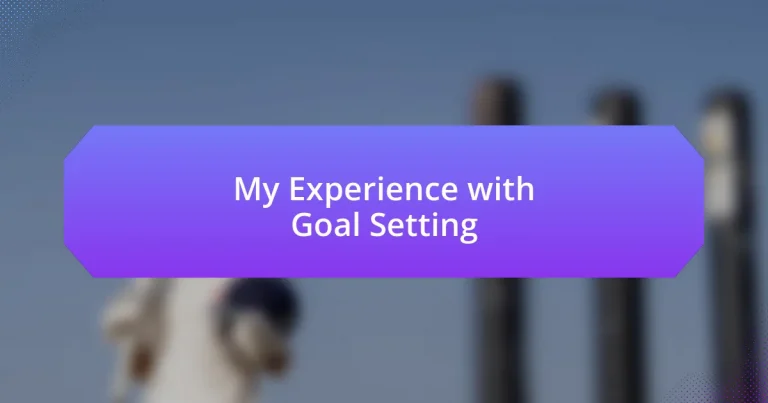Key takeaways:
- Specificity in goal setting enhances clarity and allows for measurable achievements.
- Balancing various types of goals—personal, career, health, financial, and relationships—contributes to overall growth and happiness.
- Embracing challenges and celebrating small victories fosters resilience and motivation throughout the goal-setting journey.
- Flexibility in adjusting goals and having a support system are vital for maintaining progress and building confidence.

My Introduction to Goal Setting
I still remember the first time I set a goal for myself—it was during my junior year in high school. I wanted to improve my grades, particularly in mathematics, which had always been a struggle for me. I can still feel that mix of excitement and apprehension as I wrote down my goal. It made me wonder: is it possible to turn a weakness into a strength?
That experience taught me the power of specificity. Instead of just saying, “I want to do better in math,” I broke it down into achievable steps: attend extra tutoring sessions twice a week and practice for at least 30 minutes a day. Looking back, I realize that putting these actions into place made a tangible difference. Have you ever felt that sense of clarity when you articulate what you want?
Setting that goal wasn’t just about academics; it created a sense of purpose. With each small victory, like understanding a tricky concept, I felt a surge of confidence. I started to see that goal setting goes beyond merely achieving external outcomes; it’s about the journey of growth and self-discovery. How have your own experiences with goals shaped who you are today?

Understanding the Importance of Goals
Setting goals is crucial for direction and motivation in life. From my perspective, having clear objectives transforms vague aspirations into measurable achievements. When I reflect on times I’ve hit a milestone, like completing a marathon, I realize how that journey would have felt aimless without a clearly defined finish line. How do you feel when you see your progress toward a goal? It can be incredibly satisfying, right?
Moreover, goals serve as a roadmap. They help you prioritize what truly matters and minimize distractions. I still remember when I had multiple projects due at once. By setting deadlines for each, I could focus better and manage my time efficiently. It’s like I found my way through a maze; without those goals, I might have wandered aimlessly.
Finally, there’s the psychological aspect that I find fascinating. Achieving goals triggers a sense of accomplishment that boosts self-esteem. I recall a time when I dedicated myself to learning a new language. Every new word felt like unlocking a door to a whole new world. That success not only improved my skills but also reinforced my belief in my ability to achieve what I set my mind to. What about you? Have you experienced that wonderful rush of confidence after reaching a goal?
| Importance of Goals | Impact on Personal Growth |
|---|---|
| Direction and Clarity | Enhances Self-awareness |
| Motivation and Focus | Builds Confidence |
| Prioritization of Values | Encourages Accountability |

Types of Goals to Consider
When I think about the different types of goals, I find it helpful to categorize them. Goals can vary greatly, from personal to professional, each serving its own purpose and impact. For example, I’ve set short-term goals like daily exercise, which keep me active and energized. In contrast, long-term goals, such as saving for a home, can provide a sense of security and future stability. It’s fascinating how differentiating the goals I set can shape my daily decisions and overall outlook.
Here are some types of goals to consider:
- Personal Development Goals: Focusing on skills, hobbies, or emotional well-being.
- Career Goals: Aiming for promotions, skill enhancement, or networking milestones.
- Health and Fitness Goals: Setting targets for physical activity, nutrition, or mental health improvements.
- Financial Goals: Creating budgets, saving for specific investments, or reducing debt.
- Relationship Goals: Striving to improve connections with family, friends, or partners.
Reflecting on my experiences, each type of goal has its unique flavor and presents its own challenges. For instance, I remember the thrill of setting a fitness challenge for myself and how those small daily targets kept me focused and motivated. Balancing all types of goals can be tricky, but when I look back, I see how each aspect contributes to my overall growth and happiness.

Overcoming Challenges in Goal Setting
As I navigated my journey of goal setting, I encountered numerous challenges that tested my resolve. One significant hurdle was the tendency to set unrealistic expectations. I remember planning to run a marathon without building up my stamina first—guess how that ended! By adjusting my goals to be more achievable, like starting with a 5K, I discovered the importance of celebrating small victories, which kept my motivation levels high.
Another challenge I faced was managing distractions and competing priorities. Life can be unpredictable, and I often found my personal goals overshadowed by urgent work deadlines. It made me question whether I could truly pursue my aspirations. However, I learned that carving out specific time slots—even just 20 minutes a day—was essential. This small commitment provided the structure I needed, and over time, it became a habit that enriched my life.
Then there’s the emotional aspect of goal setting. I vividly remember feeling frustrated when progress stalled, often leading to self-doubt. Instead of wallowing, I started to embrace the setbacks as part of the journey. I realized that perseverance through those tough moments makes achievements more meaningful. Have you ever felt that way? For me, reflecting on those challenges transformed my perspective, turning obstacles into stepping stones toward success.

Tracking and Measuring Progress
Tracking progress in goal setting is like holding a mirror to your journey. I remember when I first started keeping a journal to log my workouts and daily accomplishments. It felt oddly satisfying to see each entry as a tangible step forward. Have you ever tried tracking your progress? For me, it was eye-opening—seeing months of effort laid out made me feel both proud and motivated to keep pushing forward.
Another tool I found helpful was using a visual representation of my goals, such as a progress chart. I often assigned myself weekly milestones and colored in blocks as I completed them. This simple act of coloring felt rewarding and made the process more interactive. It was fascinating how a colorful chart could spark joy and enthusiasm when I saw it filling up, almost like a visual celebration of my journey.
In the world of goal setting, numbers often tell a story. I’ve learned to measure progress not just by the end result but by smaller, incremental achievements. This change in mindset helped me build resilience; instead of feeling defeated by the distance yet to cover, I appreciated how far I had already come. Have you ever noticed how little wins can build substantial momentum? Each tiny step, each small victory, can be the fuel that drives you forward.

Lessons Learned from My Journey
One significant lesson I learned is the importance of flexibility in my goal-setting approach. There were days when I felt overwhelmed, and I had to reassess my targets. I remember frantically re-evaluating my plans during a particularly busy week—it was then that I realized it’s okay to adjust timelines and expectations without feeling like a failure. Have you ever faced a similar situation where altering your goals made all the difference?
Another key insight was the value of celebrating small successes. I used to brush off minor achievements, thinking they were insignificant. However, I discovered that taking moments to acknowledge these victories helped me build confidence and motivation. Whether it was treating myself to a favorite coffee after a productive week or simply sharing my wins with a friend, these small celebrations ignited a sense of accomplishment that fueled my progress.
Lastly, I found that surrounding myself with supportive people enriched my journey immensely. There were times when self-doubt crept in, and it was my friends and mentors who reminded me of my capabilities. The conversations we had not only reinforced my commitment but also provided fresh perspectives. Have you ever leaned on your support system during challenging times? Often, their encouragement can be the nudge we need to keep moving forward.














